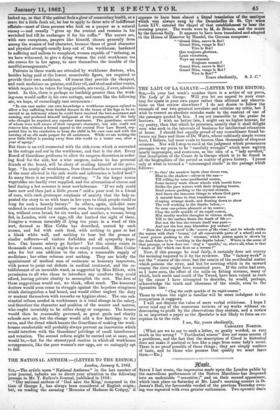TEE LADY OF LA. GARAYE :—(LETTER TO THE EDITOR). Sru,—In
your last week's number there is a notice of my poem, The Lady of to Garaye. Will you let me appeal to your cour- tesy for space in you own paper rather than attempt any observa- tions on that review elsewhere ? I do not desire to follow the example of our two greatest novelists and criticize my critic, but I wish to correct an absolute mistake made in the context of one of the passages quoted by him. I am not insensible to the praise he bestows. b I wish no better fate, I might say no higher honour, for my poetry, than that which he promises, namely that it shall delight men who seek in the intervals of business for intellectual relaxation at home. I should feel equally proud of any resemblance found be- tween my lines and those of Dr. Watts, whose sublimely simple verses have, I believe, led more souls to heaven than thousands of eloquent sermons. Nor will I stop to cavil at the judgment which pronounces passages in my poem to be "carefully wrought" which were wq4ten nearly impromptu, and contemns, as the idea of a "lady novelist," that description of the Count de la Gamye which is to be found in all the biographies of the period as matter of grave history. I pause only at what is termed a "mismanaged simile" in the passage which follows; "' As thro' the meadow lands clear rivers run, Blue in the shadow—silver in the sun—
Till rolling by some pestilential source, Some factory work whose wheels with horrid force Strike the pure waters with their dripping beams, Send poison gushing to the crystal streams, And leave the innocent things to whom God gave A natural home in that translucent wave Gasping strange death, and floating down to show
The evil working in the depths below,—
So man can poison pleasure at its source ; Clog the swift sparkle of its rapid course, Mix muddy morbid thoughts in vicious strife, Till to the surface floats the death of life ;—
But not the less the stream itself was pure—
And not the less may blameless joy endure.' "Here the 'factory work' is the source of the river,' and its wheels strike the waters with their 'beams,' (of all conceivable parts of a wheel) and so send poison gushing to the streams,' which poison again is shown by the dead fishes to be working in the depths below.' Where is the sense of that passage, or how does one clog' a sparkle,' or, above all, what is that death of life' which can float on a stream ?"
Now, if this passage be read fairly, it certainly does not convey the meaning imputed to it by the reviewer. The factory work" is not the "source of the river, but the source of the pestilential matter which poisons the river, and but for meeting which in its onward course the river might have remained pure. If the critic had seen, as I have seen, the effect of the mills on fishing streams, many of which, both north and south of the Tweed, have been ruined as such by the cause I have attempted to describe, he would, perhaps, acknowledge the truth and closeness of the simile, even to the figurative line: "Clog the swift sparkle of its rapid course."
Those to whom the sight is familiar will be more indulgent to the comparison it suggests.
I will not dispute the value of mere verbal criticisms. I hope I never read any of the numerous reviews of my works without en- deavouring to profit by the observations they contain, and a review in so important a paper as the Spectator is not likely to form an ex- ception to to the rule.
I am, Sir, yours obediently,
CAROLINE NORTON.
[What are we to say to such a letter, so gently worded, so very much in the wrong? "Pestilential source" does not mean source of a pestilence, and the fact that the description of Claud is historical does not make it poetical or less like a page from some lady's novel. There is no proof possible of these things ; they are simply matters of taste, and to those who possess that quality we must leave them.—En.]






























 Previous page
Previous page